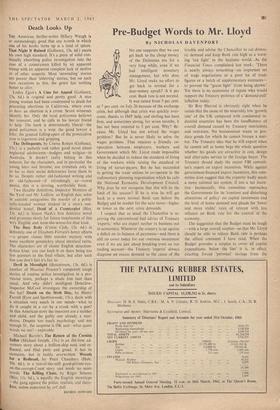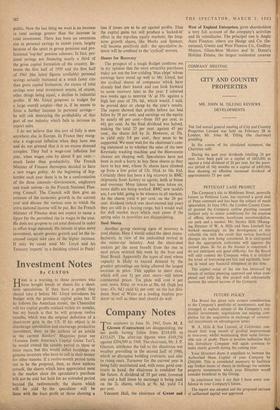Pre-Budget Words to Mr. Lloyd
By NICHOLAS DAVENPORT
No one supposes that we can get back to the cheap money of the Daltonian era for a very long while, even if we had intelligent monetary management, but why does Mr. Lloyd make no effort to get back to normal for a dear-money epoch? A 6 per cent. Bank rate is not normal. It was raised from 5 per cent. to 7 per cent. on July 26 because of the exchange crisis, but although that crisis was quickly over- come, thanks to IMF help, and sterling has been firm, and sometimes strong. for seven months, it has not been restored to 5 per cent. Why? Be- cause Mr. Lloyd has not solved the wages problem? But he is never likely to solve the wages problem. That requires a friendly co- operation between employers, workers and Government which Mr. Lloyd made impossible when he decided to reduce the standard of living of the workers while raising the standard of living of surtax-payers. But he has succeeded in getting the trade unions to co-operate in the rudimentary planning organisation which he calls the National Economic Development Council. Why does he not recognise that this will be the limit of his success? If he is wise he will get back to a more normal Bank rate before the Budget and be readier for the next move—higher or lower as the next crisis demands.
I suspect that as usual the Chancellor is re- ceiving the conventional bad advice of Treasury 'experts,' who are expert neither in business nor in economics. Whenever the country is up against a deficit on its balance of payments—and there is still no cover today for our overseas investment even if we are just about breaking even on our trading account—the Treasury 'experts' always diagnose an excess demand as the cause of the trouble and advise the Chancellor to cut domes- tic demand and keep Bank rate high as a warn- ing 'red light' to the business world. As the Financial Times complained last week: 'There is nearly always something—an important set of wage negotiations or a poor lot of trade figures or a batch of supplementary estimates— to prevent the "green light" from being shown.' Yet there is no economist of repute who would support the Treasury pretence of a 'demand-pull' inflation today.
Sir Roy Harrod is obviously right when he insists that the cause of the miserably low 'growth rate' of the UK compared with continental in- dustrial countries has been the insufficiency of overall demand caused by Treasury restrictions and restraints. No businessman wants to pro- duce goods for which he cannot foresee a mar- ket. The Treasury idea that he will export when he cannot sell at home begs the whole question whether his goods are attractive in cost, design and after-sales service to the foreign buyer. The Treasury should study the recent FBI commit- tee's report on export incentives. While against government-financed export incentives, this com- mittee does suggest that the exporter badly needs a more rational tax system, if not a tax incen- tive. Incidentally, this committee reproaches the Government for its 'constant and disturbing alterations of policy' on capital investment and the level of home demand and pleads for 'lower and more stable' rates of interest with less reliance on Bank rate for the control of the economy.
The suggestion that the Budget must be tough —with a large overall surplus--so that Mr. Lloyd should be able to reduce Bank rate is perhaps the silliest comment I have read. When the Budget provides a surplus to cover all capital expenditures 'below the line' it is, in effect, exacting forced 'personal' savings from the public. Now the last thing we want is an increase in total savings greater than the increase in total investment. There has been an enormous rise in personal savings in recent years, largely because of the spurt in group pensions and pro- fessional `top-hat' pension schemes. In fact, per- sonal savings are financing nearly a third of the gross capital formation of the country. Be- tween the first half of 1959 and the first half of 1961 (the latest figures available) personal savings actually increased at a much faster rate than gross capital formation. An excess of total savings over total investment means, of course, other things being equal, a decline in industrial profits. If Mr. Lloyd proposes to budget for a large overall surplus—that is, if he means to force a further increase in personal savings— he will risk destroying the profitability of that part of our industry which fails to increase its export sales.
I do not believe that this sort of folly is seen anywhere else in Europe. In France they recog- nise a wage-cost inflation when they have one and do not pretend that it is an excess demand complex. They had a wage-cost inflation last year, when wages rose by about 8 per cent.— much faster than productivity. The French Minister of Finance thereupon decided to have a new wages policy. At the beginning of Sep- tember each year there is to be a confrontation of the three interests—Government, employers and trade unions—in the French National Plan- ning Council. The Council will then give an estimate of the economic growth in the current year and discuss the various uses to which the extra national income will be put. But the French Minister of Finance does not expect to name a figure for the permitted rise in wages in the year. He does not propose to cut total demand in order to offset wage demands. He intends to plan more investment, secure greater growth and let the in- creased output take care of the higher incomes. If only we could send Mr. Lloyd and his Treasury 'experts' to a finishing school in Paris!



































 Previous page
Previous page